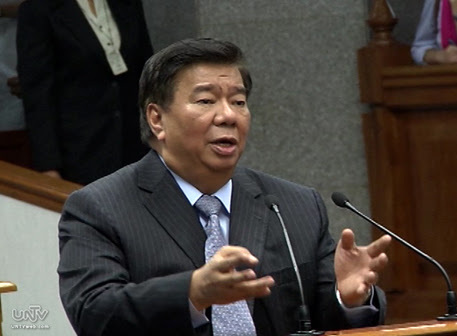After the public and the legal experts gave their two-cents, it is now time for the lawmakers of our land to vent out their opinions on the recent controversies that the Supreme Court is facing because of the numerous issues of flip-flopping cases that they were involved in. I have given my piece, on the Pioneer Vs. Keppel Case and the SteelCorp liquidation Case, and so does a number of other individuals and groups. Most are adamant about the reopening of previously-closed cases and retracting of prior final decisions. After all, if the highest court of the land cannot seem to make up its mind, don’t you think it won’t be too long until the time comes when everyone will just stop putting their faith in our Supreme Court? It would be such an ugly picture to perceive, and for the love of democracy and justice, I am fervently praying the powers that be can finally put these issues to rest.
One of the most loquacious senators this country has ever had ~ and mind you, she very well knows what she’s saying and everyone is just compelled to listen whenever she speaks ~ Miriam Defensor-Santiago, a former judge herself, opines that the decision the Supreme Court made over the PAL case is “extremely unfortunate” and that it could undermine the court’s credibility. She said that under SC rules, a party cannot file a second motion for consideration, or appeal, without leave from the court.
She further opined:
“So you file two documents. First, a motion pleading with the Court to allow for a second motion for reconsideration, then you file your second motion for reconsideration. My question is, was there an order from the Supreme Court allowing this second motion for reconsideration?” the senator said, adding the appeal was not even a pleading but a letter.
Second appeals are only allowed in case the decision was “legally erroneous,” patently unjust, or will cause irreparable damage or injury, Santiago said.
“So, the Supreme Court only has to look into its own internal rules and see if these three requirements have been complied (with),” Santiago said.
She added that even if the decision was issued by the wrong division, “will that technicality now suffice to overturn 13 years of legislative research and analysis on this problem?”
“I am angry because, as a citizen, I fear that the citizenry might turn its back on the Supreme Court, the bulwark of our civil liberties. If the Supreme Court loses its credibility in this instance, it will be impossible to regain it in a number of years,” she warned.
Former justice secretary, Senator Franklin Drilon, surmised that the reversal “would appear to be not in the usual procedure,” and has the following assessment about the issue:
This is not the first time that the SC has gone back on a supposedly final decision.
It previously reversed itself on the cityhood of 16 towns that were declared cities despite opposition from the League of Cities of the Philippines (LCP).
The LCP opposed the cityhood of the 16 towns, saying the 16 municipalities do not have large enough population or income to qualify as cities.
The SC ruled against the 16 towns in 2010, and then upheld their cityhood early this year. The LCP appealed the decision but lost.
“I am no longer surprised at the flip-flopping,” Drilon said.
The Supreme Court is gearing up for yet another controversy, this time involving the Philippine Air Lines {PAL} and Flight Attendants and Stewards Association of the Philippines {FASAP}.
Here is a brief background about the case:
Some 2,600 positions of ground workers were outsourced this month after President Benigno Aquino III authorized the airline’s spin-off program.
On July 22, 2008, the SC ruled in favor of Fasap declaring as illegal the dismissal of 1,400 flight attendants in 1998.
A month later on August 20, PAL filed a motion for reconsideration but this was junked with finality in October 2, 2009.
However, on January 2, 2011, PAL filed a second motion for reconsideration, which the SC denied last September 7, saying “no further pleadings shall be entertained.”
The airline was also ordered to reinstate the affected flight attendants with full back wages.
Anakpawis Representative Rafael Mariano enthused that the SC committed severe injustice to workers due to this development, and here is the rest of his take about the controversial case:
“In the hierarchy of employees’ rights, the right to security of tenure is high, if not the highest. The paramount value of that right is recognized and guaranteed under the 1987 Constitution. The other complementary rights are meaningless to an unemployed worker,” he said.
Mariano added that the SC’s reversal of its ruling on the Fasap case completes the “triple whammy of attack” against PAL pilots, cabin crew and airport workers by various courts, the Department of Labor and Employment and Malacanang.
Some 2,600 positions of ground workers were outsourced this month after President Benigno Aquino III authorized the airline’s spinoff program.
On July 22, 2008, the SC ruled in favor of Fasap declaring as illegal the dismissal of 1,400 flight attendants in 1998.A month later on August 20, PAL filed a motion for reconsideration but this was junked with finality in October 2, 2009.
However, on January 2, 2011, PAL filed a second motion for reconsideration, which the SC denied last September 7, saying “no further pleadings shall be entertained.”
The airline was also ordered to reinstate the affected flight attendants with full back wages.
first image is from philStar.com, whilst the second one is from untvweb.com



